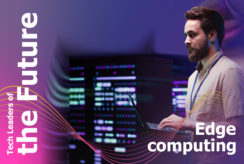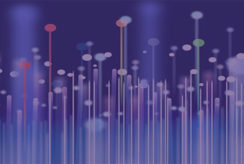Liberty, Equality, … Responsibility?
A report by the consulting firm Wavestone, in partnership with the group Caisse des Dépôts and La Poste.
Thriving in France, IoT services are creating added value for citizens, companies and local authorities. However, for connected solutions to be massively integrated into our daily life, they must provide concrete answers to the ethical, legal, technological and economic issues.
The development of an IoT for people would provide the French industry with a critical competitive advantage to face the competition from digital giants. This key finding comes as the result of an analysis conducted by the consulting firm Wavestone, carried out in partnership with the Caisse des Dépôts group and La Poste, entitled “Liberty, Equality … Responsibility? Iot for people, a driver of value creation in France!
The study of the market’s most advanced figures, crossed with the vision of more than forty sectoral and IoT experts made it possible to pinpoint 4 key findings:
IoT emerged in France in the early 2010s, but 2018 marks the turning point:
- For the first time, in 2017 France is the leading capital destination in Europe for IoT (Source Dealroom, 2017).
- For 94% of investors, the most qualified talents in the world for Deep Tech (products or services based on groundbreaking innovations) are notably in France (source Wavestone, 2017).
- French companies integrate IoT in their strategic development plan (launching IoT programs, creation of dedicated entities, etc.) to go beyond the experimental phase.
Wavestone has identified the sources of value for which IoT is a major lever as well as the market movements induced in France by this technology.
Wavestone gives different actors the keys to allow them to get started: this analysis offers companies a lever of strategic differentiation based on the principle of the IoT for people, and shows users and communities that a real alternative offer to the digital giants exists.
Digital sovereignty over data hosted in France, cybersecurity, algorithm and system transparency, design in compliance with ethical rules, possibility for the user to simply manage its confidentiality, decision control mechanisms, human links in addition to connected solutions … All these elements are variations of the IoT for people.
Some French players are already positioned on the IoT for people and intend to offer an alternative to digital giants, such as the Vyv Group that develops a connected health guide to make patients health actors, Docapost and its IoT platform “Digital Hub” which hosts the data in France as well as Greater Lyon, which applies to its partners a policy of data reutilization with variable fees to preserve a healthy competitive environment. The IoT will be what we make of it and the IoT for people, Made in France, offers a real alternative to the digital giants.
For companies, it is about adopting an alternative business positioning to the digital giants, both as a sales argument and a guarantee of respect for the general interest.
For citizens and communities, it’s about showing that they can use responsible IoT solutions, allowing them to stay in control of their data and the services they use.
To exploit this value, digital giants are making significant investments to penetrate collective or private means of transport, housing and health systems. Here are some of the movements observed on the French market:
- On the mobility side, we are witnessing the transition from a compartmentalized value chain to a system of alliances between vehicle manufacturers, infrastructure managers, public transport operators and territories. This is evident with companies such as PSA and Vinci Autoroutes who are collaborating on automatic vehicle guidance on arrival at the Saint-Arnoult tollbooth or Renault-Nissan with Transdev, the Rouen Metropolis, the Normandy Region and Matmut, who are experimenting with the first on-demand mobility service with electric autonomous vehicles on roads open to the public in Europe.
- On the real estate side, the players in the building sector are diversifying downstream in three gradual levels: connected construction, operation and occupant services. As an example, Icade delivers residential buildings with an open connectivity base and establishes a partnership with MaSmartHome to offer a flexible package of connected equipment. Moreover Bouygues Immobilier, with its Flexom offer, connects new homes and leaves the choice to the occupant as to whether they wish to use these services or not.
- On the health side, industrials in health supervision and therapy are facing competition from new entrants. Consumer electronics manufacturers, like Nokia, offer connected health objects and patient-oriented applications.
You can also find more details about Iot in our latest insight:
IoT – From fashionable trend to large-scale transformation
*Source: study by the American consulting firm A.T. Kearney as part of the Institut Montaigne report, 2015




